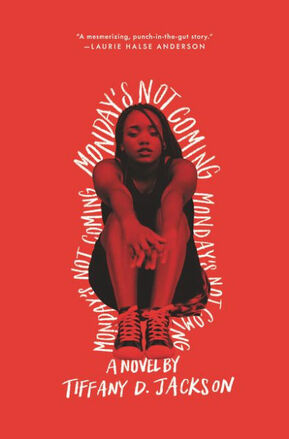"About 501 children have been reported missing in Washington DC since the start of 2017."--Aeryon Jackson

About 501 children have been reported missing in Washington DC since the start of 2017. Metropolitan Police Department’s statistics show that over 5 years, 200 children are reported missing each month. According to FBI missing persons data from 2015, 181,455 out of 490,450 of the missing people under the age of 21 are black. That is a total of 37 percent.
“When white girls go missing they’re all over the news,” said author Tiffany D. Jackson in a recent by Epic Reads interview. “They’re on Good Morning America; their story is front page everywhere, but when black kids go missing it’s like we don’t actually--we’re not human. We get, you know, a paragraph on page 5. I thought that was something I really wanted to touch upon, the actual biases and media biases within the world as well,” she continued.
Jackson is the critically acclaimed author of the novels Allegedly, and Let Me Hear a Rhyme. Jackson’s latest novel, Monday’s Not Coming does just that. It confronts themes of missing children of color and gentrification. Another theme is mental health, especially for those who have gone through a traumatic experience.
Jackson really wants her readers to step into her character's shoes and understand what they’re going through, and their pain. One of the biggest reason’s Jackson writes books that are ripped from the headlines is because she hates the idea of kids being spoon-fed topics like gentrification, mental health, and racism. She wants her readers to know that these things are happening to actual kids, and that bad things really do happen to their peers.
“Monday Charles is missing, and only Claudia seems to notice,” begins the first sentence of the book’s summary. “Claudia and Monday have always been inseparable—more sisters than friends. So when Monday doesn’t turn up for the first day of school, Claudia’s worried... As Claudia digs deeper into her friend’s disappearance, she discovers that no one seems to remember the last time they saw Monday. How can a teenage girl just vanish without anyone noticing that she’s gone?”
The novel’s format is very interesting. The story moves between the past, the future, and the now. These sections are labeled as “The Before”, “Before the Before”, and “The After.” As you read, you piece together these different parts of Claudia’s life: what she knew and remembered about Monday, and what she didn’t. For some, this could be challenging to follow at times, but it also holds the reader’s attention and sparks the reader’s interest.
“Writing in past and present is challenging and I honestly thought I made the story too difficult to follow,” said Jackson in an interview for the blog, MeganWriteNow.com. “The best advice I could give is to write a super detailed book/outline bible, the same way the fantasy authors do, that way it will help you keep track of the dueling story lines.”
Monday’s Not Coming recently won a 2019 Coretta Scott King/John Steptoe New Talent Author Award. The novel fits multiple genres, including thriller, mystery, and young adult fiction.
Even the novel’s title lures you to read the story. It makes you ask questions like: “Who or what is Monday?” “The day Monday?” “What happened to Monday?” “Why is Monday not coming?” Some of those questions are answered when you read the short summary of the story, which reveals the mystery to an extent. To solve the mystery, of course, you’ll have to continue reading.
“When white girls go missing they’re all over the news,” said author Tiffany D. Jackson in a recent by Epic Reads interview. “They’re on Good Morning America; their story is front page everywhere, but when black kids go missing it’s like we don’t actually--we’re not human. We get, you know, a paragraph on page 5. I thought that was something I really wanted to touch upon, the actual biases and media biases within the world as well,” she continued.
Jackson is the critically acclaimed author of the novels Allegedly, and Let Me Hear a Rhyme. Jackson’s latest novel, Monday’s Not Coming does just that. It confronts themes of missing children of color and gentrification. Another theme is mental health, especially for those who have gone through a traumatic experience.
Jackson really wants her readers to step into her character's shoes and understand what they’re going through, and their pain. One of the biggest reason’s Jackson writes books that are ripped from the headlines is because she hates the idea of kids being spoon-fed topics like gentrification, mental health, and racism. She wants her readers to know that these things are happening to actual kids, and that bad things really do happen to their peers.
“Monday Charles is missing, and only Claudia seems to notice,” begins the first sentence of the book’s summary. “Claudia and Monday have always been inseparable—more sisters than friends. So when Monday doesn’t turn up for the first day of school, Claudia’s worried... As Claudia digs deeper into her friend’s disappearance, she discovers that no one seems to remember the last time they saw Monday. How can a teenage girl just vanish without anyone noticing that she’s gone?”
The novel’s format is very interesting. The story moves between the past, the future, and the now. These sections are labeled as “The Before”, “Before the Before”, and “The After.” As you read, you piece together these different parts of Claudia’s life: what she knew and remembered about Monday, and what she didn’t. For some, this could be challenging to follow at times, but it also holds the reader’s attention and sparks the reader’s interest.
“Writing in past and present is challenging and I honestly thought I made the story too difficult to follow,” said Jackson in an interview for the blog, MeganWriteNow.com. “The best advice I could give is to write a super detailed book/outline bible, the same way the fantasy authors do, that way it will help you keep track of the dueling story lines.”
Monday’s Not Coming recently won a 2019 Coretta Scott King/John Steptoe New Talent Author Award. The novel fits multiple genres, including thriller, mystery, and young adult fiction.
Even the novel’s title lures you to read the story. It makes you ask questions like: “Who or what is Monday?” “The day Monday?” “What happened to Monday?” “Why is Monday not coming?” Some of those questions are answered when you read the short summary of the story, which reveals the mystery to an extent. To solve the mystery, of course, you’ll have to continue reading.


